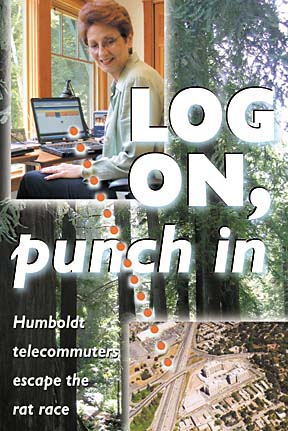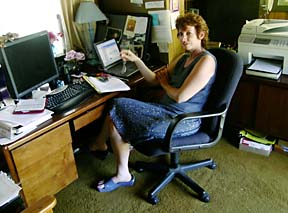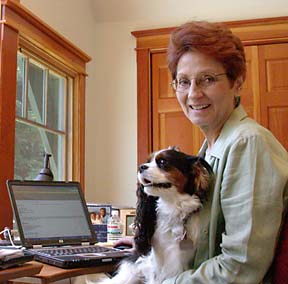 
April 15, 2004
IN
THE NEWS | PUBLISHER | GARDEN | THE HUM | PREVIEW | CALENDAR

Shari Duron, Hewlett-Packard
business strategy consultant. Photo by Helen Sanderson.
Aerial of east Palo Alto.
by HELEN
SANDERSON
JUST OUTSIDE HER OFFICE WINDOW,
Catherine Puckett [photo
below] sometimes sees deer tiptoeing
through a grove of redwood trees. Once or twice she has looked
up from her computer to spot a black bear lumbering past. The
scenic view from her desk would likely be envied by her co-workers,
if only they knew where she worked.
Puckett's "office"
is a one-room cabin next to her home in Freshwater. Inside the
cozy little lodge, rigged with two phone lines and a Digital
Subscriber Line (DSL) high-speed Internet connection, is a desk
with two computers -- a desktop and a laptop -- filing cabinets,
a stereo and a woodstove. The private and informal atmosphere,
in addition to the fact that she often works in the wee hours
of the morning, lends itself to wearing comfy work clothes, including
pajamas.
"I dread the day that I
have to get videoconferencing!" she added with a laugh.
Puckett, 48, the United States
Geological Survey deputy communications chief for the Western
Region, has been telecommuting from her home since 1999. She's
the only person that she knows of in her organization who works
in this fashion.
With the emergence of telecommuting
-- or working for a company from your home via the Internet,
telephone and fax machine -- more employees can live almost anywhere,
hundreds and even thousands of miles away from their employer.
For some telecommuters looking to trade their business suits
for Birkenstocks, their destination of choice was Humboldt County.
But while the digital era is making it easier to escape from
the city, skepticism remains as to whether or not remote employment
is all that it's cracked up to be.
When Puckett decided to move
five years ago to Humboldt from Washington, D.C., where she worked
at the USGS's national headquarters, she had not considered the
idea of taking her job with her.
What the mother of three did
consider -- courtesy of conversations with her two sisters, who
live in Humboldt County -- was that jobs were scarce and wages
were notoriously low on the North Coast. Neither factor dissuaded
her plans to move west, but they were cause for concern, especially
since her then-husband (they've since divorced) had recently
been laid off. Providing financially for her family was critical,
of course, but raising her children -- now ages 18, 14 and 8
-- in a small, safe community where they'd be close to relatives
was becoming a priority.
The stresses of living in the
big city were taking a toll. For instance, driving just two miles
to take the kids to soccer practice took a half hour; the Pucketts'
home was robbed one night as the family slept, and not long before
they moved away, a neighborhood girl, close to the age of Puckett's
eldest daughter, who was then 13, was kidnapped from her school
bus stop and sexually assaulted.
Once Puckett was settled upon
relocating in Humboldt County, the first order of business was
to hunt for a job. With a background in science -- Puckett has
master's degrees in both wildlife ecology and journalism -- she
applied for a position with the U.S. Fish and Wildlife Service
stationed in Arcata, and got an offer. The salary was $20,000
less than what she was already making, but it didn't matter.
She told her boss that she'd been hired for a job in Arcata and
got ready to pack up her things.
"I was really lucky because
my boss [at USGS] sat me down and said, `OK. Let's see how we
can arrange this so you can move but still work for us,'"
Puckett recalled.
She was reassigned to the Western
Region post, based in Seattle, so that she would be able to work
from her home in Humboldt County. In addition to keeping her
job, she also kept her considerable salary (equivalent, she said,
to that of a tenured full professor at HSU). The only stipulation
was that she had to be bumped down a level in job ranking, to
a GS13, since she would no longer be in a management position.
Taking the downgrade also annulled her chances of promotion,
which in turn meant that she would be ineligible for a raise,
since her income already put her at the top of the pay scale
for her level.
Puckett's job is a high-profile
one that keeps her writing press releases and speeches, fielding
e-mails (sometimes up to 100 of them) and phone calls every day
from folks at places like CNN and the Associated Press who want
to know the latest on geological events in the western U.S. At
3:30 p.m. last Tuesday, for instance, when Puckett was getting
ready to call it a day, a 5.2 offshore earthquake shook the coast
of San Diego, and phone calls and e-mails from the media poured
in for the next couple of hours.
It's humbling if not humorous
to think that nationally vital information is dispatched from
a pajama-clad mom in a rural town like Freshwater. Puckett talks
about it in unpretentious terms; she calls the cabin her "writing
hovel" and chalks up her plum gig more to luck than smarts.
"There is not a day that
goes by that I don't look out my window and think about how grateful
I am to be here. For 23 years of my adult life I didn't live
near my family and now I can.
"I really think [telecommuting]
is an option that can allow people to live the kind of life that
they want," Puckett said. "Your life outside of work
is the most important thing there is."
Wired world
Without a doubt, access to the
Internet has changed the way the world communicates. These days,
conversations are often typed instead of spoken. Bills are paid
with the click of a button instead of the lick of an envelope
and a hello to the postman. School assignments are turned in
to a teacher's e-mail rather than her hand. Right now some readers
are likely logged onto the Journal's Web site, scrolling
the computer screen with their mouse rather than flipping the
page with newsprint-smudged fingers.
With last fall's completion
of the fiber-optic cable that linked Humboldt County to southern
California -- and essentially the rest of the world -- through
a broadband connection, more North Coast residents have entered
the digital era.
There are no data on the number
of telecommuters on the North Coast, but there are probably more
than there were a few years ago, according to Erick Eschker,
a Humboldt State professor and director of the Index of Economic
Activity for Humboldt County. He added that, considering government
predictions of a decline in lumber harvesting -- meaning hundreds
of jobs lost here in the next five years -- and the increased
accessibility to technology, Humboldt County is "better
poised for telecommuting" than it was in the past.
But while telecommuting seems
to be a niche that fits Puckett quite well, some experts say
that working for a company from home is not suited for everybody.
Tina Nerat, a board member for
the Redwood Technology Consortium and consultant for the North
Coast Small Business Resource Center, says that full-time telecommuting
does not work out for many people. Isolation from coworkers,
Nerat said, causes the telecommuter to be forgotten about. She
added that telecommuting is not usually a good career move for
someone looking to be promoted. Pay raises too, are harder to
get when you're not seen or heard from.
"Once you're gone, you've
fallen off of the radar of other people in the office,"
Nerat said. She gave an example: "Changes will be made in
company policy, and [a telecommuter] won't know about it because
they're not there."
Puckett would agree. She said
that since she began telecommuting, she has worked harder than
before to maintain her contacts within the USGS and also with
scientists, researchers and media. Weekly teleconference calls
keep her in touch with her department, she said.
Keeping visible
Shari Duron [photo at right],
58, works for Hewlett-Packard as a business strategy consultant
from her home on 20 acres of wooded land in McKinleyville. Part
of being a successful telecommuter, she said, is making yourself
an indispensable part of the company. Her husband, Hal Work,
57, echoed her sentiments. He also telecommuted for HP -- one
of the largest computer companies in the world -- and before
being laid off as a result of last year's  controversial
merger with Compaq, Work was employed at HP for 20 years. controversial
merger with Compaq, Work was employed at HP for 20 years.
"One thing you have to
do is make your presence felt. If there are issues [in the company]
you need to make your opinions known, otherwise you're out of
sight and out of mind," Work said.
When the couple moved here in
the spring of 2000 from Mountain View, 20 minutes from HP's headquarters
in Palo Alto, they were not concerned about how they would fare
as telecommuters. Many employees they knew at HP telecommuted
from all parts of the country, so their decision to move 300
miles north didn't cause much of a stir. Most of the people in
Duron's 25-person consulting team, in fact, are scattered all
over the United States, from Massachusetts to Washington.
"It's possible to be `virtually'
present these days," Duron said. "Your workplace is
becoming irrelevant. What really matters is how well you perform."
The telecommuting transition
for Duron was pretty much a breeze. The only setbacks that she
faced were a slow Internet connection -- which has since been
resolved with a DSL hook-up -- and traveling to HP, which she
does almost once a month. Closures at Confusion Hill on Highway
101 have sent her backtracking to the alternate route on Highway
299, and fogged-in flights have also waylaid plans.
Aside from the occasional travel
snafu, Duron said that the luxuries of working from home far
outweigh the benefits of working in an office building. Like
Puckett, Duron and Work enjoy incredible views from their home
offices, which are just down the hall from one another. Duron
has been in the middle of a conference call while simultaneously
watching a family of foxes play in her unpaved driveway. During
her mid-day break she sometimes takes her dogs for a walk, waters
her flowers or plays a round of pinball -- an arcade-style Monopoly
version of the game is tucked in the corner of her office.
"A gray cubicle just isn't
comparable anymore," Duron said.
The laundry is calling...
Other issues that Nerat mentioned
as problems for telecommuters are self-discipline and staying
focused. For some people who work out of their home, it's tempting,
she said, to start washing dishes, folding laundry or running
errands when they should be working. For Puckett, distractions
like housework are minimized thanks to having her "hovel"
separate from her home.
Suellen Lowry [photo at left],
50, a Bayside resident, is an independent consultant for various
environmental and faith organizations, including Earthjustice,
the largest public interest environmental law firm in the country.
For Lowry, her home and work life have begun to merge in the
past six years that she has been telecommuting.
"Frankly, it takes less
time for me to throw in some laundry and push a button than it
would to sit down and chat with a coworker," Lowry said.
Cutting out the time spent shooting
the breeze with colleagues, or organizing events like the annual
Christmas party, she says, has made her a more efficient employee.
Now she works with three clients as opposed to just one.
Another element of her merged
home and work lives is evident in her daily to-do lists. Lowry
prioritizes projects based upon how much concentration is required
to finish them, and the ones that are not so laborious she saves
for the moments when there might be distractions at her house.
"I know that when my husband
or my son are home I can type up a memo or respond to a bunch
of e-mails, so I tend to get the more time-consuming things done
when I'm here alone," Lowry said.
Lowry's office is right in the
center of the action -- the living room of the home she shares
with her husband and 12-year-old son.
"When I started [telecommuting]
I was the mother of a 5-year-old. I liked being in the middle
of the house because my son would come home from school and we
could visit for a little while, and then when he would go play
I could keep an eye on him while doing my work," Lowry said.
She is the type of person, she added, who could work in the middle
of Grand Central Station.
Again, this is an area that
Nerat warns against. Soon-to-be mothers sometimes assume that
after they have their child, they will be able to work part-time
in their home office while their baby goes down for a nap. Usually,
she says, it doesn't work out that way, because as new mothers
often find, caring for an infant leaves little time or energy
for much else.
And as for wages, sometimes
keeping a big city job does not mean keeping your big city wage.
Duron explained that at HP, when employees decide to telecommute
from another town, their wage is adjusted according to the cost
of living in that area. This way, people who live in the cities
are paid more, since it costs more to live there. (She declined
to say what her income is.)
Lowry, too, mentioned that she
is not making a killing as a telecommuter. Since she is an independent
consultant for various organizations now instead of a full-time
employee with just one company, her income fluctuates widely
from year to year. It depends, she says, on how much work her
client needs done and also how large the projects are. The average
per capita income for Humboldt County according to the 2000 U.S.
Census is $17,203, and Lowry says there have been times since
she has been telecommuting that her income has dipped below that.
Before working for Earthjustice,
Lowry was an attorney in private practice. Certainly what she
makes now, as a telecommuter, is less than she made as a lawyer
in Washington, D.C., she said. But during those days, she said,
she worked until late at night all week long and then went back
to the office on the weekends. She has chosen her current line
of work in part to make a living, but mainly because she loves
working for environmental causes and living in a beautiful environment,
she said.
"Every time I've made a
job decision by following my heart, I've lost money, but every
time I've looked back I've known that I made the right decision,"
Lowry said.
Telework:
Making home your headquarters
by HELEN
SANDERSON
MANY PEOPLE CONFUSE TELECOMMUTING
WITH TELEWORK -- though the two are a bit different.
Telework, also known as microenterprising,
is work that is done for one's own home-based business using
a computer. It is seen by many as the future of remote employment.
The implications for the economic development of rural areas,
some say, are particularly interesting.
Andrew Cohill, CEO of DesignNine,
a technology consulting firm in Virginia, was invited to Humboldt
last year to speak about technology management in rural communities
at the Redwood Technology Consortium's Tech Conference. Like
Tina Nerat, a member of the consortium's board of directors,
he believes telecommuting is not a great career move for most
people.
"In the late 1990s, advocates
were saying that telecommuting was the wave of the future, but
is hasn't turned out the way they said it would," Cohill
said.
However, outlook for microenterprising
is more promising, he said.
Microenterprising entrepreneurs
may consider settling in a rural town if they can be convinced
that it offers a great quality of life and that they can have
access to affordable broadband connections, Cohill said. Then,
their business can grow and they can recruit more people to move
near them.
The drawbacks are that not everyone
wants to be his or her own boss, nor an entrepreneur. An additional
challenge for teleworkers on the North Coast is persuading banks
to give them a loan to start a non-traditional business.
The North Coast Small Business
Resource Center, where Nerat is a consultant, offers help to
those who want to begin their own business. That's where Hal
Work [photo above] turned to last year when he wanted to start selling
his photography.
Work, 57, of McKinleyville,
telecommuted to his job at the Silicon Valley-based Hewlett Packard
until he was laid off last year. To occupy the time, he started
combing through some of his old photography -- a hobby that he
has had for the past 40 years. With computer programs like Adobe
Photoshop, Work began changing the look of some of his old photos.
He approached the North Coast SBRC with the idea of selling his
work, and creating a Web site where it could be seen. The organization
helped him set it up.
His business, Lucid Works, has
just gotten off the ground this year, and though sales are slow
in coming, the prospects are exciting. People can see his work
at local galleries and venues like Arts!Arcata and then view
them again on his Web site, lucid-works.com, which he anticipates
will help him make more sales.
The change in livelihood has
been both unexpected and welcome, Work said.
"I never realized I'd be
in this business."
IN
THE NEWS | PUBLISHER | GARDEN | THE HUM | PREVIEW | CALENDAR
Comments?

© Copyright 2004, North Coast Journal,
Inc.
|